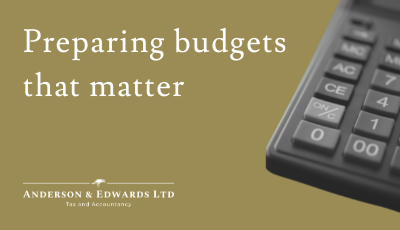
Your accounts don’t have to be hard to understand. Understanding the numbers can empower you to make better decisions, period. Here is part 1 of our series: ‘Maximising your accounting information. First up, we share the in’s and out’s of preparing budgets in a way that matters for your business.
Planning money budgets is a very useful thing to do in life. We do it everywhere in our personal lives - when calculating our monthly shop, saving up for a special holiday or even renovating our homes. In business, it’s not any different. Looking forward is more important than looking behind.
Your assumptions will vary depending on what you want to achieve in the next 12 months. This varies for every business. Here are some examples:
· You expect sales to grow by 150% compared to last year
· You aim to increase gross margin by 5% over the period compared to last year
· You are planning on opening a new location
· You are looking to recruit more employees
Although these assumptions are very linear, you can have multiple assumptions working together. For example, if you want to increase your sales by 150%, will you incur any additional costs, i.e. marketing or employing more staff members?
Having your budget means you can factor this into your accounting system, i.e. Xero (this is one we use and recommend). By having an intuitive platform that can reflect the numbers for you, you will be able to see how you are performing against your budget throughout the year. There’s no use having your budget on a spreadsheet that never gets looked at after all.
Measuring your actual numbers against the budgeted ones also helps improve your accuracy when budgeting in future.
We recommend reviewing your budget every quarter. It’s important to continuously update it with any additional factors during this period too. For example, winning a big contract or switching suppliers which will increase your gross margin.
Your budget can also allow you to justify more significant expenditure. One month you may need to spend more on marketing or new technology. It will be easier for you to see which month is best for the costs to be spent, especially if your business is performing below your expected budget. Knowing trigger points in advance is the beauty of budgeting.
Remember: Over-projecting costs is always better than underestimating them.
We are huge advocates for Xero and using technology to help clients with their budgeting. It’s all about factoring your business needs and making it work for you.
Let us know if you need any help with budgets, accounts or cashflow: Enable JavaScript to view protected content.. We help business owners like you every day.
© 2025 Anderson & Edwards Ltd|Registered in Scotland SC678768|Privacy Policy|Website by Broxden